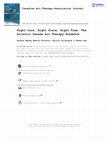Papers by Sylvia Calatayud

Canadian journal for the study of adult education, 2018
International migration continues to rise at unprecedented rates, rates exceeding the growth of t... more International migration continues to rise at unprecedented rates, rates exceeding the growth of the world’s population (UN, 2015)[i]. This vast movement of people influences social, economic and political systems in complex ways, including interpersonal and international gender relations. In this article, we discuss two studies that involved participatory photography with women in Nova Scotia who recently immigrated to Canada: Refugees Learning and Storytelling through Participatory Photography (2013-15) and Refugees/ immigrants and refugee claimants: Negotiating place and perceptions (2015-17). Using a feminist theoretical perspective, we examined the participants’ photographs and transcripts of meetings to identify the women’s learning processes. We conclude with our reflections on the impact that these arts-based projects had on participants and the wider community, namely that participatory photography can enhance our collective understanding of migration, including the gendered...

Canadian Art Therapy Association Journal, 2019
Abstract Despite a growing number of art therapists in some areas of Atlantic Canada, a significa... more Abstract Despite a growing number of art therapists in some areas of Atlantic Canada, a significant percentage of the general population is currently not aware of art therapy as a clinical mental health intervention. With the exception of a few larger hospitals, it is often not a practice incorporated into mental health organizations, educational institutions, or community agencies. Misinformation about the term art therapy has limited people in their understanding of its inherent benefits. Atlantic Canada’s geography, climate, and cultural and language differences have created additional barriers for residents in accessing these services. Inspired by the art hive movement, the history of the Grenfell traveling missions, and the present state of mental health reform in Newfoundland, three art therapists set out to connect with community professionals in an “on the road” approach to art therapy outreach in smaller towns, remote locations and with other marginalized groups. These collaborations resulted in open art studios for each visited community. These studios have the potential to become ongoing and permanent mental health resources for the region.

Canadian journal for the study of adult education, 2018
International migration continues to rise at unprecedented rates, rates exceeding the growth of t... more International migration continues to rise at unprecedented rates, rates exceeding the growth of the world’s population (UN, 2015)[i]. This vast movement of people influences social, economic and political systems in complex ways, including interpersonal and international gender relations. In this article, we discuss two studies that involved participatory photography with women in Nova Scotia who recently immigrated to Canada: Refugees Learning and Storytelling through Participatory Photography (2013-15) and Refugees/ immigrants and refugee claimants: Negotiating place and perceptions (2015-17). Using a feminist theoretical perspective, we examined the participants’ photographs and transcripts of meetings to identify the women’s learning processes. We conclude with our reflections on the impact that these arts-based projects had on participants and the wider community, namely that participatory photography can enhance our collective understanding of migration, including the gendered...
In this paper we focus on five unique arts-informed research methods, poetry, photography, zines,... more In this paper we focus on five unique arts-informed research methods, poetry, photography, zines, journaling, and altered art-making. Centring on voice and acknowledging the limitations of language each method explores multiple ways of knowing, learning, and sharing. Such methods allow research participants to work at uncovering an awareness of their new lifelong learning contexts and bring into focus the meaning of their lived experiences in holistic ways (Brigham, 2011). All five methods point to practical counter-hegemonic adult education approaches.
2014 Casae Annual Conference, May 23, 2014

Canadian Art Therapy Association Journal, 2019
ABSTRACT
Despite a growing number of art therapists in some areas of Atlantic Canada, a signific... more ABSTRACT
Despite a growing number of art therapists in some areas of Atlantic Canada, a significant percentage of the general population is currently not aware of art therapy as a clinical mental health intervention. With the exception of a few larger hospitals, it is often not a practice
incorporated into mental health organizations, educational institutions, or community agencies. Misinformation about the term art therapy has limited people in their understanding of
its inherent benefits. Atlantic Canada’s geography, climate, and cultural and language differences have created additional barriers for residents in accessing these services. Inspired by the art hive movement, the history of the Grenfell travelling missions, and the present state of mental health reform in Newfoundland, three art therapists set out to connect with community professionals in an “on the road” approach to art therapy outreach in smaller towns, remote locations and with other marginalized groups. These collaborations resulted in open art studios for each visited community. These studios have the potential to become ongoing and permanent mental health resources for the region.

International migration continues to rise at unprecedented rates, rates exceeding the growth of t... more International migration continues to rise at unprecedented rates, rates exceeding the growth of the world’s population (UN, 2015) . This vast movement of people influences social, economic and political systems in complex ways, including interpersonal and international gender relations. In this article, we discuss two studies that involved participatory photography with women in Nova Scotia who recently immigrated to Canada: Refugees Learning and Storytelling through Participatory Photography (2013-15) and Refugees/ immigrants and refugee claimants: Negotiating place and perceptions (2015-17). Using a feminist theoretical perspective, we examined the participants’ photographs and transcripts of meetings to identify the women’s learning processes. We conclude with our reflections on the impact that these arts-based projects had on participants and the wider community, namely that participatory photography can enhance our collective understanding of migration, including the gendered realities of migration.
Thesis Chapters by Sylvia Calatayud

Deep Roots and New Beginnings: Exploring the Re-construction of Identity through Photographic Life Narratives with Immigrant Women, 2015
The intention of this thesis is to examine the lived experience of immigrant women on
their path ... more The intention of this thesis is to examine the lived experience of immigrant women on
their path towards a new cultural identity in the context of using art therapy, participatory
photography and personal narratives. The methodology used for this research is a combination of
Art Based Research, Story Telling and Phenomenology descriptions. The primary question is:
what are the lived experiences of immigrant women during the re-construction of their cultural
identity, and how is this reflected in personal narratives?
The secondary questions that are raised relate to the methodology and its effectiveness:
how this process might be reflected in a photographic life narrative and the art of migrant
women, and what are the values of these techniques during this process? This study will take
place in Halifax, Nova Scotia where immigrants arrive from many other countries.










Uploads
Papers by Sylvia Calatayud
Despite a growing number of art therapists in some areas of Atlantic Canada, a significant percentage of the general population is currently not aware of art therapy as a clinical mental health intervention. With the exception of a few larger hospitals, it is often not a practice
incorporated into mental health organizations, educational institutions, or community agencies. Misinformation about the term art therapy has limited people in their understanding of
its inherent benefits. Atlantic Canada’s geography, climate, and cultural and language differences have created additional barriers for residents in accessing these services. Inspired by the art hive movement, the history of the Grenfell travelling missions, and the present state of mental health reform in Newfoundland, three art therapists set out to connect with community professionals in an “on the road” approach to art therapy outreach in smaller towns, remote locations and with other marginalized groups. These collaborations resulted in open art studios for each visited community. These studios have the potential to become ongoing and permanent mental health resources for the region.
Thesis Chapters by Sylvia Calatayud
their path towards a new cultural identity in the context of using art therapy, participatory
photography and personal narratives. The methodology used for this research is a combination of
Art Based Research, Story Telling and Phenomenology descriptions. The primary question is:
what are the lived experiences of immigrant women during the re-construction of their cultural
identity, and how is this reflected in personal narratives?
The secondary questions that are raised relate to the methodology and its effectiveness:
how this process might be reflected in a photographic life narrative and the art of migrant
women, and what are the values of these techniques during this process? This study will take
place in Halifax, Nova Scotia where immigrants arrive from many other countries.
Despite a growing number of art therapists in some areas of Atlantic Canada, a significant percentage of the general population is currently not aware of art therapy as a clinical mental health intervention. With the exception of a few larger hospitals, it is often not a practice
incorporated into mental health organizations, educational institutions, or community agencies. Misinformation about the term art therapy has limited people in their understanding of
its inherent benefits. Atlantic Canada’s geography, climate, and cultural and language differences have created additional barriers for residents in accessing these services. Inspired by the art hive movement, the history of the Grenfell travelling missions, and the present state of mental health reform in Newfoundland, three art therapists set out to connect with community professionals in an “on the road” approach to art therapy outreach in smaller towns, remote locations and with other marginalized groups. These collaborations resulted in open art studios for each visited community. These studios have the potential to become ongoing and permanent mental health resources for the region.
their path towards a new cultural identity in the context of using art therapy, participatory
photography and personal narratives. The methodology used for this research is a combination of
Art Based Research, Story Telling and Phenomenology descriptions. The primary question is:
what are the lived experiences of immigrant women during the re-construction of their cultural
identity, and how is this reflected in personal narratives?
The secondary questions that are raised relate to the methodology and its effectiveness:
how this process might be reflected in a photographic life narrative and the art of migrant
women, and what are the values of these techniques during this process? This study will take
place in Halifax, Nova Scotia where immigrants arrive from many other countries.